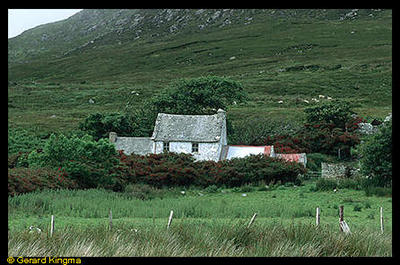
The rain spatters
viciously
on the double-glazed windows
when the evening
draws in, so we pull across
the curtains, lay
some more of those Bord na Mona
turf briquettes
upon the spitting, hissing
crackling fire, then nurse
our fiery drams
in Waterford tumblers,
listening to but half ignoring
the shriek
and whistle of the wind.
"I don't know," says Uncle Liam
"how much of this you can understand."
Upstairs
in this whitewashed cottage
planted, perversely
on the edge
of nearly nowhere
sits a four-poster bed
with sagging springs
in a room
no longer used nor visited
occupied now
by dust and sepia photographs
wherein
began the genesis
the procreative urges
of an ongoing family tragedy.
The lashing rain, the heartless wind
derides our humanity.
Now as in times past
and in the coming times to be
it mocks our hopes
our aspirations
our nationality.
Pain, turbulence, famine, grief.
On the bedroom wall
housed in an ancient frame
is a faded stitching sampler
"God Bless Our Happy Home"
piously, but uncertainly
accomplished, by her own hand,
by Emily May MacCarthy
on October 20, 1843,
the fifth of eleven children
and one of the seven
who starved to death
along with her despairing parents.
Other photographs of gentlemen
wih large moustaches
stare into the unforgiving lens
with comical expressions
of puzzled defiance,
arranged in front of studio
backdrops, and very
tasteful potted palms.
--James Boyle Roche. Photographer.
15 Bridge Street. Ennis --
is stamped within an oval
in the corner: the address
still exists, I went to have a look,
it is now a fast-food restaurant.
Wedding couples
equally unrelaxed, stare
across the years of mutual
incomprehension: I could not
even begin
to talk to these people.
He sits, she stands,
but she places a tentative
pleading hand
upon his rigid farming shoulder.
A history of unhappiness.
But there's another
strangely out-of-place picture
of my great-uncle Marteen Rua
the red-haired boy
shot dead in the civil war
a cocky 19-year-old
with a cheeky grin
brandishing
an enormous revolver
and with a paparoosi cigarette
dangling from his left jaw.
I can tell from the look of him
we could have had a drink,
we could have had a talk, he cuts through
all the lace-curtain piety
the respectability
the fear: he looks
so modern, so devil-me-care.
But the rain will have none of it:
it comes down in buckets
it comes down in cascades.
You will never never never,
you will never never be free, it says:
in this country you will never
never be released from the past.
Liam is uncharacteristically
subdued, even embarrassed: he shifts
from foot to foot, in front
of the warm and blazing fire.
We are warmed outside
and inside, too
thanks to the single malt.
Upstairs
there are more old photographs
here and there
on the dresser and on the sideboards:
cloche hats on smiling elegant women,
charabancs, baggy suits
on the gents, who grin and squint
in the harsh sunlight
of long forgotten days,
some of them sporting
those ridiculously
shortened neckties: my unknown
recent ancestors.
A flicker of empathy
of understanding
runs through
this threnody of regret.
"Listen, I think I'm going to bed,
it's been a really long day," I say.
Liam frowns. An awkward
silence ensues: " Emmmm ...
Listen to me. There's something
I really need to tell you.
It's about the family .... "
Don't.
It will keep for another hundred years.